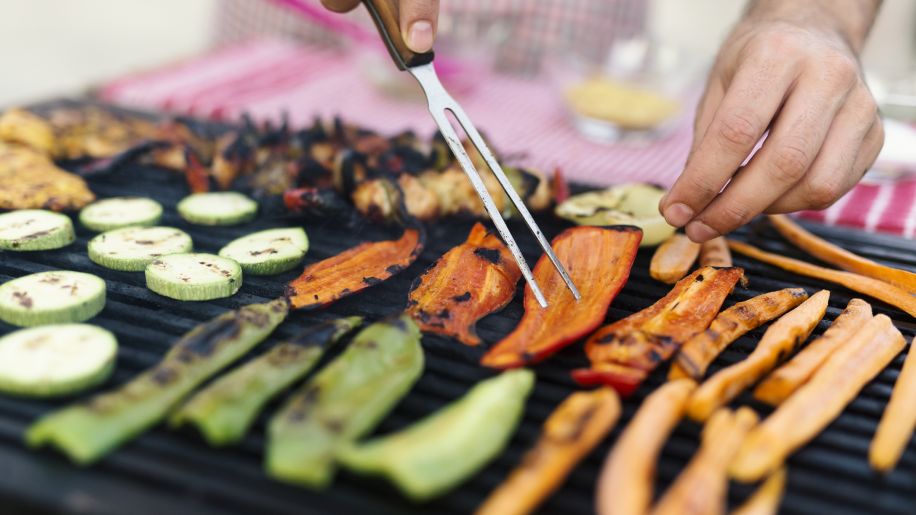6 ways to enjoy food when you have ulcerative colitis
These expert tips can help you take comfort in food again.
Updated on April 28, 2025

Sitting down to a delicious meal is supposed to be an enjoyable part of the day. But that's not always easy if you have ulcerative colitis, a type of inflammatory bowel disease (IBD) that causes sores in parts of the digestive tract. When a person has ulcerative colitis, food can affect how good—or bad—you feel.
Luckily, a few dietary guidelines can help you better manage the condition, says Lori Woodward, RD, a dietitian at Atlanta Gastroenterology Associates. "These tips will aid in the digestion and absorption of foods for IBD patients and may help relieve many of the symptoms associated with this condition," she says.

Prepare to eat outside the home
People with ulcerative colitis often face significant challenges when it comes to eating at restaurants. Many with the condition simply avoid them because of how hard it can be to control or modify meals. To overcome this obstacle, try reviewing the restaurant menu beforehand, so you can scan options and choose your order ahead of time. When you arrive at the restaurant, request changes to your dish. It’s not an inconvenience; kitchen staffs are often happy to accommodate people with special dietary needs.
If you’re traveling or going to a movie or other event, simply bring your own snacks. And if you’re eating at a friend or family member’s house, consider taking a prepared dish to ensure you have something available.

Eat smaller, more frequent meals
"This is one of the most common tips I suggest for my IBD patients," says Woodward. Eating smaller, more frequent meals and snacks—rather than just three large meals—is recommended because your digestive system can better handle smaller loads. This may also help increase your intake of vitamins, minerals, and other necessary nutrients. Since ulcerative colitis disrupts the body’s ability to absorb nutrients, it’s common for people with the disease to have deficiencies.

Opt for cooked vegetables instead of raw
Eating a healthy diet, including fruits and vegetables, is key for people with ulcerative colitis due to the risk for malnutrition and nutrient deficiencies. Eating raw vegetables can have unintended consequences, however. "Raw fruit and vegetables, as well as legumes, can be gas-forming and may lead to additional bloating, gas, and stomach pain," Woodward explains.
Rather than eliminate fresh produce completely, plan to eat it cooked rather than raw. Green beans, eggplant, sweet potatoes, and carrots can be good options for people with ulcerative colitis during a flare-up. Limit or avoid fried vegetables and vegetables with seeds, which can be irritating.

Avoid trigger foods
No specific diet has been proven to prevent flares of ulcerative colitis. One way to help prevent and treat flares is to avoid trigger foods, or foods that worsen your symptoms. Common triggers include:
- High-fiber produce, such as cabbage, cauliflower, and kale
- Spicy, fatty, or sugary foods
- Artificial sweeteners, such as aspartame
- Dairy products
- Alcohol
- Drinks with caffeine, such as coffee
To learn your trigger foods, keep a record of what you eat and any symptoms you experience afterward. It’s not necessary to avoid foods that don’t cause symptoms. In fact, it’s important to restrict as few foods as possible to maintain the function of your digestive system.

Drink plenty of fluids
People with ulcerative colitis have a higher risk for dehydration due to inflammation and large fluid losses. Taking in plenty of fluids throughout the day helps keep you well hydrated and aids in digestion. Just be sure you reach for plain water over caffeinated, carbonated, or alcoholic drinks, which can make ulcerative colitis symptoms worse. "You should drink half of your body weight in ounces of fluid, which means that a 140-pound person needs 70 ounces a day," says Woodward.
Fluid needs increase during exercise and during ulcerative colitis flares with diarrhea. If tolerated, electrolytes lost from diarrhea can be replaced by consuming sports drinks with potassium and sodium.

Talk to your healthcare provider and dietitian
It's important to work with a healthcare provider and dietitian to develop a comprehensive treatment plan that includes medication, lifestyle changes, and personalized eating recommendations. You can ask them what foods may or may not be harmful for you. For example, people with ulcerative colitis have a higher risk for colorectal cancer, and ultra-processed foods are linked to a further increase in colorectal cancer risk. With expert advice, along with these helpful tips, you can start enjoying food again despite having ulcerative colitis.

Wang L, Du M, Wang K, et al. Association of ultra-processed food consumption with colorectal cancer risk among men and women: Results from three prospective US cohort studies. BMJ. 2022;378:e068921.
Crohn’s & Colitis UK. Food: Eating with Crohn’s or Colitis. Accessed April 16, 2025.
Crohn’s and Colitis Foundation. The risk of colorectal cancer in Crohn’s disease and ulcerative colitis patients. Accessed April 15, 2025.
MedlinePlus. Low-fiber diet. July 24, 2024.
UCSF Health. Nutrition tips for inflammatory bowel disease. Accessed April 14, 2025.
UVA Health. Nutrition and ulcerative colitis. March 2024.
Featured Content

article


video

article

article

article
